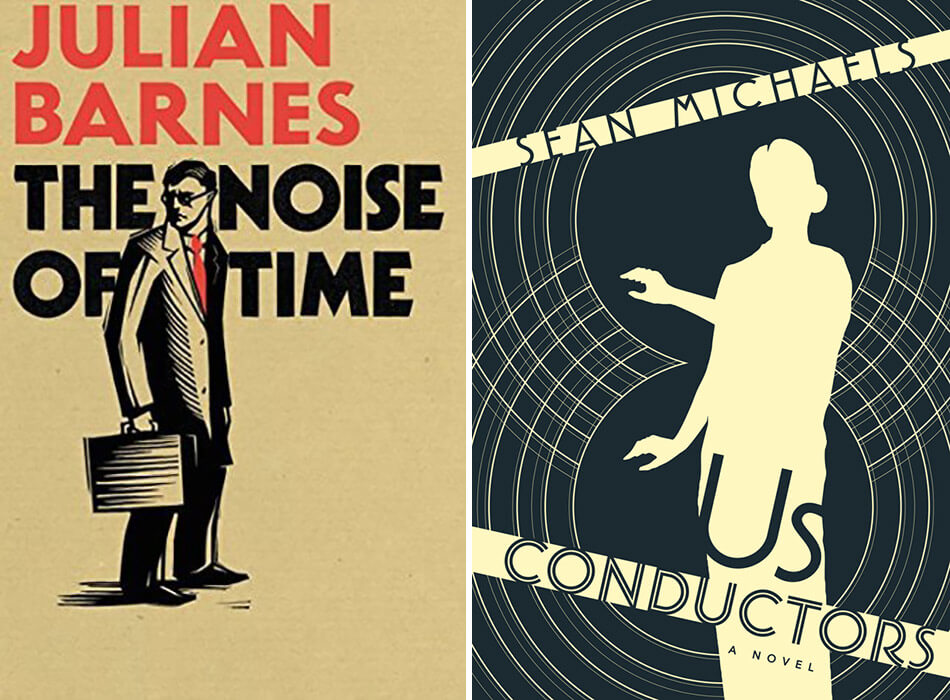
Us Conductors by Sean Michaels // The Noise of Time by Julian Barnes
Summer vacation is a time to savour personal freedom and indulge in delayed gratifications. For music lovers, this includes not only listening to music but also reading about it. Two books on the theme of music under the tyranny of the U.S.S.R. may seem like a dispiriting choice for vacation reading, but what better time is there to celebrate how lucky you are to be free enough to read, and free altogether from the brutality of a totalitarian regime?
The Noise of Time, by Julian Barnes, recounts the life of composer Dimitri Shostakovich, who lived from 1906 to 1975. Us Conductors by Sean Michaels is the story of Leon Theremin (1896 to 1993), the inventor of an early electronic instrument known variously as the etherphone, thereminphone, termenvox and the theremin. Though not widely played today, it is still in use and was showcased last January in a performance of Alexander Rapoport’s sonata for piano and theremin at Gallery 345.
Music is not created in a vacuum, and neither man escaped the dark terror of Soviet despotism, though the nature and severity of its intrusion differed drastically. Shostakovich lived with the threat of imprisonment or murder during the period of The White Terror, as well as a kind of soul murder — lifelong creative coercion and exploitation as a musical poster boy for the regime. Theremin spent close to twenty years in the Gulag camp system, between 1938 and 1956.
These brutal periods are described in the two books. Covering the same period of time and the same political regime, they have interesting similarities even though they are each unique, idiosyncratic works. The Noise of Time remains close to the known facts of Shostakovich’s life, and is drawn from two main sources, a biography and Shostakovich’s memoir, Testimony. In this respect, there is little novelty in the novel. Instead, it captures the voice, personality, reflections and inner life of the composer as he weathers life’s vicissitudes. One of his main strategies was irony: “When truth-speaking became impossible —because it led to immediate death — it had to be disguised… And so, truth’s disguise was irony. Because the tyrant’s ear is rarely tuned to hear it. ..In an ideal world, a young man should not be an ironical person. .. (it) prevents growth, stunts the imagination… But this was not an ideal world, and so irony grew…overnight, like a mushroom; disastrously, like a cancer.” Eventually, such irony creeps into his compositions, such as the Fifth Symphony, premiered in 1937 after his first denunciation by Stalin. “…those with asses’ ears (were permitted) to hear in his symphony what he wanted to hear. They missed the screeching irony of the final movement, that mockery of triumph. They heard only triumph itself…He had ended the symphony fortissimo and in the major. What if he had ended it pianissimo and in the minor?..”
Leon Theremin’s inventive genius was a major contributor to his remarkable endurance, (he lived to age 95). By devising a way for his team to increase productivity in the labour camp, he got himself transferred to a more civilised incarceration in a secret laboratory. Though music is central to his story, and Theremin performed on his instrument, he does not seem passionately connected to music, though he is passionate about certain female musicians.
In each book, the protagonist has a direct, destabilising interaction with Power. Theremin is unexpectedly asked to teach Vladimir Ilyich Lenin a lesson on his instrument in front of a coterie of powerful Commissars. This hands-on demonstration gives new meaning to the term ‘performance anxiety’.
“(Lenin’s) arms were relaxed. I lifted his left hand away from the volume antenna… then I moved the right, adjusting pitch… I adjusted Lenin’s arms and felt him opening and closing his fingers, …I gradually sensed that he was anticipating the moves… I looked at… Lenin, Lenin himself, drawing music from the air. He had a narrow smile. H was fumbling and also certain…When he finished, Lenin lowered his hands. The theremin wailed and screamed. I dashed in to silence the device as Lenin yelped…and he shook his head with a mixture of embarrassment and self-satisfaction…”
In The Voice of Time, Shostakovich has to tell Josef Stalin that his music has been banned, a fact the dictator seems not to know even though he sanctioned the ban.
“Part of him was conscious that the slightest wrong syllable might land him in a labour camp, while another part of him to his surprise, was beyond fear. .. “over here (my music) is not played… It is forbidden… by the State Commission for Repertoire…”
“And who gave such an order?… No,” the voice of Power replied. “We didn’t give that order… The mistake will be corrected. None of your works has been forbidden… this has always been the case. There will be an official reprimand.”
A few days later… he received a copy of the original banning order. Stapled to the top of it was a document recognising the decree as illegal and reprimanding the State Commission for Repertoire for having issued it. The correction was singed, “Chairman of the Council of Ministers of the USSR. I Stalin.”
Whether either of these encounters actually took place is hard to say, but the scenes create a vivid impression of how terrifying the tension was under which they worked. It would be interesting to ask Julian Barnes and Sean Michaels whether they reflected on how much easier their own creative tasks were, arduous as they may have been, writing in London, England and Montreal, Canada. Aside from being absorbing narratives, both books will elevate your appreciation of the security and safety in which you enjoy your leisure.
#LUDWIGVAN
Want more updates on Toronto-centric classical music news and review before anyone else finds out? Get our exclusive newsletter here and follow us on Facebook for all the latest.



